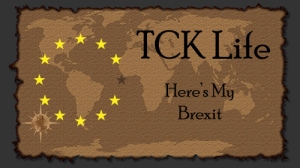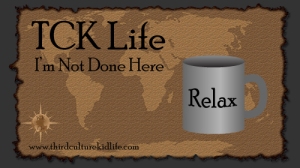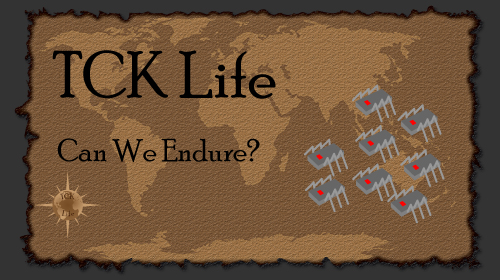
I have a lot of faith that, while this post will be very much outside the wheelhouse of Third Culture Kid Life as a whole, that this reader-base is the exact one to understand my thought process. We’re going to get a little sci-fi up in Third Culture Kid Life today, not as much as you’d think in the grand scheme of things, but even with sci-fi as a theme we’re going to do so with a grounding in cultural adaptation. At the core, that’s what this mental exercise is about. Ultimately, it’s the culture of humanity as a whole that will be the deciding factor in how you think about this problem, but this post isn’t just about TKCs. It’s about all of humanity. And to be frank, it was sparked through recent conversations in my life from discussions about SpaceX and Batman, sorry, I mean Elon Musk, trying to build colonies to save us from being trapped here on Earth.
So I have a question for you. One I want you to consider as the cultural adapter you are, having watched so many people and absorbed so many cultures in your developmental years. I want you to look back at everything you’ve seen, everything you’ve experienced, consider how you’ve seen the world interact with itself and how communities and leaders prioritize the lives of those around them, and then do your best to take a look forward at how we’re progressing as a species trapped sharing a world. I want to know the answer to this seemingly simple question, and I’d like you to answer now before you continue reading into my thoughts of the situation:
Does our species, in our current state and with where we are currently heading, have the capacity to survive and endure?
Think about it for a moment, and decide on an answer. And if you want to push the button a little further, why don’t you consider this moral side of the equation as well:
If we do have the capacity to survive and endure, do we deserve to?
The simple concept of spreading our species across the galaxy is the only way to ensure, in the event of total planetary destruction, that we do not disappear from existence. It’s a noble goal, one that is met with real threat given the multiple mass extinction events our planet has endured in its lifetime and the harsh reality that should one come again, we would not survive. In that simple moment, humanity would be wiped out.
But the question runs deeper than that. There are other elements to consider, too. Take, for example, the fact that all intelligent species are required to pass a pinnacle moment in their evolution in which the entire species possesses the knowledge to eradicate the entire species, and as an entire species, they must make the decision not to. That fact is a basic inevitability of scientific advancement. The advent of nuclear technology was the first time humanity, in its entire history, held the power to eradicate all life across the planet with the push of a button. But that technology and the power it possesses is entirely controlled. Science doesn’t stop with nuclear technology.
So what does this mean? Take nanotechnology, which for those who aren’t aware is the development of microscopic robots that can self replicate based on a certain code. Robots that build themselves, and do so by attacking a certain thing. They are being looked at as potential cures to everything, with the capability to say, self replicate on cancer cells, they would continue to grow and spread throughout your body eating bad cells until none are left, and then they’d die with nothing left to replicate on.
That same technology could be used to eradicate all life on Earth. If you were to, say, code it to replicate on carbon, then it would consume every carbon-based life-form (that’s all life) on this planet without any way to stop it.
But that’s not where this problem ends. The simple advancement of knowledge means that more information becomes more readily available every single day. There will, barring the event we regress instead of continue forward in technological development, be a time where the ability to create this technology or something even worse, will be taught at a grade-school level. Unlike nuclear options where the materials are hard to develop and even harder to deploy, technology like nano-bots could be something that a third grade science classroom could create, code, and release. It may not be that. It may be something else entirely. But one day, we will discover knowledge that allows us to effectively delete all life, and one day further down the line, that knowledge will be available to every single human on Earth, just by the nature of scientific progress.
That’s where this question comes into play. One day, we as a species will have the ability to answer it. Everyone on Earth will have the capacity to destroy everyone else. Mutually assured destruction not just in the hands of world leaders, but in the hands of every single living, breathing, thinking person on the planet, with the tools and resources available to anyone to wipe out everything we have ever known. This is why I ask you this question, my cultural specialists, why I want to know what you think about the inevitability of this crossroads in intelligence. It’s a crossroads any intelligent species would inevitably face, and one that we will too be forced to endure at some point in our future.
Does our species, in our current state and with where we are currently heading, have the capacity to survive and endure? Do we have the capability to have the knowledge in the hands of every single human to eradicate all life, and yet make the conscious and deliberate choice not to do it?
I don’t think we do. Our species has empathy, but empathy only extends as far as our neighbor in the grand scheme of life. The world can be a terrible place, where horrible things happen to countless numbers of people, but we, as a species, have the ability to turn off that empathy because it does not directly impact us or those we love. We care passionately about those we know, we may even go out of our way to help those we don’t know, but every single one of us knows our empathy lessens the further from home negative events transpire. It is why acts of empathy to strangers go viral so often, why a homeless man getting bought shoes by a police officer spreads across the internet like wildfire. Because in the end, the vast majority of people, while seeing the value and kindness in that empathy, would not have done it.
I do not believe we are fit to endure until we overcome our empathy block. I don’t think we deserve to, either. Until we can love everyone like we love those immediately in our empathy circle, we do not belong among the stars. The universe does not need our hatred, our malice, and our pain. We can be a brutal species who is only just learning to walk the fields of peace and empathy. We have barely put our foot in the water, and we cannot be trusted to not act in our own, individual, best interest. Not now. Not as we are.
I hope that one day that changes. I believe that it could, with the willingness of our species to embrace that change. I think technology can help us achieve that goal. I think that making a species-wide decision to self-evolve would be the first step towards bettering ourselves. We would have to consciously decide to change our humanity, to become more than what we are today. But as we are right now, as human kind, I do not think we possess the ability to survive with the knowledge of destruction.
But if our species were to stay as it is right now, selfish and fearful as we are, I think we would deserve what we could bring upon ourselves.
I just hope we can change before it’s too late.
But you answered the question too, my cultural geniuses. Tell me, what do you think? I want to know where we stand as a group. I want to see the hope in the words of my fellow TCKs who have seen so much of how beautiful people can be, and also how terrible we can be. What, to you, is our path to success? How does humanity earn its right to survive in the universe with all the potential that sits before us?
______________

Post By: James R. Mitchener

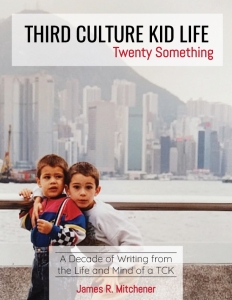
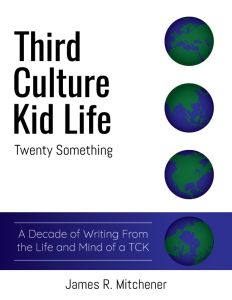


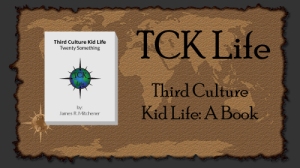 I’m turning 30 soon. This month, in fact. It doesn’t really mean anything to me personally. It’s just another rotation around the sun I’ve experienced, tallying 30. Well, actually, thanks to the Gregorian calendar not being entirely accurate, it’s probably going to be a little more than 30 years if you were to average out all the added seconds and minutes we’ve received. Or is it less? I don’t remember, I did the math once on how the past 30 years relative to me based on additions, subtractions, and alterations compounded by the incorrect value of a year impacted my time on earth in rotations around the sun, but I have no memory of the outcome. I probably did the math wrong too if we’re honest.
I’m turning 30 soon. This month, in fact. It doesn’t really mean anything to me personally. It’s just another rotation around the sun I’ve experienced, tallying 30. Well, actually, thanks to the Gregorian calendar not being entirely accurate, it’s probably going to be a little more than 30 years if you were to average out all the added seconds and minutes we’ve received. Or is it less? I don’t remember, I did the math once on how the past 30 years relative to me based on additions, subtractions, and alterations compounded by the incorrect value of a year impacted my time on earth in rotations around the sun, but I have no memory of the outcome. I probably did the math wrong too if we’re honest.